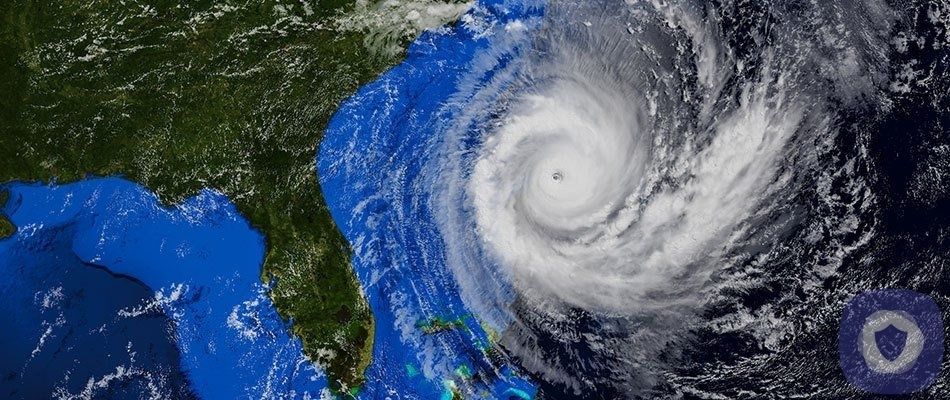Hurricane season can be wild and unpredictable and these dangerous storms can wreak havoc on your home and belongings. While hurricanes can be incredibly destructive, the good news is you generally get plenty of warning before one hits the area.
Here are 10 ways you can beef up your home security in hurricane weather, even if you need to evacuate.
1. Cover or brace windows
SecurityNerd expert, Officer James Banta, worked during Hurricane Katrina as an officer in the Biloxi Police Department and his own home was ravaged from devastating winds and water surge. Banta says hurricane shutters are a great option if you live near the coast, but it may not make sense for everyone. Instead of investing in permanent hurricane shutters, Banta suggests picking up supplies at the hardware store to make braces for your windows.
“Buy sheets of plywood, measure your windows and use brackets to hold the plywood in place. That can protect your windows or doors,” said Banta.
Although you may see people taping windows, that does absolutely nothing to ensure your safety in hurricane force winds. Banta says sticking to hurricane shelters or plywood is the only way to go when it comes to protecting those points of entry in hurricane conditions.
2. Place sandbags around your entryways
While sandbags won’t be able to help extreme storm surge, many people will be able to prevent flooding and expensive damage to their belongings by utilizing sand bags. You can generally find sandbag stations through your local municipality leading up to the storm.
Fill your sandbags and line them around any doors leading into your home. Because doors are only inches from the ground, they will likely be the first place water seeps in during heavy rain. Sandbags will be able to effectively keep stormwater out in many cases. Any stormwater that is kept out of your home is stormwater that won’t be able to damage the belongings inside your home, so sandbags are well worth having at your doorways during a hurricane.
3. Prepare your yard for the coming hurricane
Although you may think about preparing the inside of your home for strong winds and rain, you should keep an eye on the outside of your house, too. Trim trees, especially dead limbs, to prevent them from becoming projectiles. You should also round up any patio furniture, children’s toys or anything else that could fly through a window and cause damage during a hurricane. Making sure nothing is loose in your yard is important for you and your home’s safety when it comes to hurricane force winds.
4. Do a home security check up
If you have professional monitoring, it’s worth telling your security company if you think you may have to evacuate. That way the company knows if any alarm goes off, you are not present in or around the home and authorities should be notified right away. You should also ask if any of your equipment runs on battery backup. If it does, make sure those batteries are fresh. If you live in a hurricane-prone area, it’s worth asking your home security company if they offer any backup options for you in case of a power outage.
If you are self-monitoring your security system, you’ll want to make sure any battery-operated cameras or sensors are up to date and that the batteries are new.
Banta says it’s possible your home security system could go offline if you lose power. But if your system runs on a phone line with battery backup, he says you’ll have a better chance of being online.
One simple way to keep your router online during a power outage is to purchase an Uninterrupted Power Supply, or UPS. There are many different models that can provide anywhere from minutes to hours of battery power. It won’t necessarily keep you online in the worst storm conditions or for an extended amount of time, but it could keep you up and running for some time. Plus, it will continue to be useful even after hurricane season in case of any power surges.
5. Inspect your environmental protection alarms
Hurricanes cause conditions that wipe out power, flood homes and even start fires. If you’ve invested in environmental sensors for your home like a carbon monoxide detector, smoke detector or leak sensors, examine them to make sure they’re working.
“Remember, many of these items run on electricity. If you lose power, the alarms could be offline,” said Banta. But some sensors are battery powered, so it’s important to make sure batteries are up to date if your smart sensors have that backup feature.
Carbon monoxide detectors are especially important in hurricane conditions. In power outages, many people use generators to keep power running to their refrigerators or other parts of their home. But running a generator inside can be deadly. That’s because like an automobile, a generator gives off carbon monoxide. The CDC reports 206 people died using generators in their homes during a power outage between 2004-2013. You should only run an outside generator, but even if you do, testing your carbon monoxide detector prior to the storm is incredibly important to ensure that the levels in your home during and after the storm are safe for you and your family members.
6. Take inventory of your valuables
Officer Banta says people should be taking inventory of their valuables anyway in case of burglary. But for the best home security in a hurricane, you should definitely take pictures of expensive items like electronics in your home and keep notes of their serial numbers.
“It will aid with your insurance company if anything needs to be replaced. Also, there are always bad people out and about right after a storm,” said Banta.
Officer Banta hints at a fear many residents have following a bad hurricane — potential looters. If the worst happens and your home is burglarized right after a bad storm, having pictures and detailed notes about what was in your home prior to the hurricane will make it easier for police to track down stolen items.
7. Scan important items on to a flash drive
When there’s a chance your home could be flooded, that means anything from your birth certificate to insurance documents could get ruined. Scan anything you consider important onto a flash drive and make you know where that flash drive is located in case you have to evacuate. This includes those pictures you took of your flat screen television, along with insurance paperwork you could need later if the storm destroys your belongings.
8. Place valuable items in a safe
Officer Banta’s home was flooded with four feet of water during Hurricane Katrina. He prepared his home before going on duty with the police department and part of that preparation included putting important items and valuables into a safe.
“You want to look for a safe that is water and fire resistant,” said Banta. “If you have a safe with a handle on it, you can take it with you, since it won’t take up much room in your vehicle. Regardless, it’s important to make sure your safes are waterproof, especially if you live near water.”
Here are some items you may think about placing in a safe, whether it’s a portable safe or an environmentally-proofed safe within your home:
- Family heirlooms and photographs
- Jewelry
- Medications
- Flash drive with important documents scanned
- Small electronics
- Passport
Check out our picks for the best safes.
9. Prepare home hurricane evacuation plans in advance
In the case of incredibly strong hurricanes or for people living in low-lying coastal areas, it may be necessary to evacuate your home. At the beginning of hurricane season, create a checklist of exactly what you need if you have to pack up your important items to dodge the storm.
Write down everything you plan to take with you, including insurance paperwork, family heirlooms and clothing. If you have a checklist ready, you’ll be more likely to remember all your important items later on when you may be feeling too anxious to think clearly.
10. Move valuables to higher ground if possible
For home security in hurricane conditions you’ll want to move your valuables to the highest level of your home if you are evacuating. This means moving your television, computers, or any other high dollar items to the second floor, or even up into the attic. Officer Banta says he saved thousands of dollars of potential damage by moving his valuables into his attic when his home flooded during Hurricane Katrina.
Preparation is key
When it comes to safety in hurricane situations, having a plan prior to the storm will save you time and money. Taking these simple steps will ensure you not only have the proper paperwork and documentation you need if your items need to be replaced, it will also give you the best chance to keep your valuables from being destroyed.
Even in the most dire situations where evacuation is required, you can still prepare quickly if you have a plan in place. Chances are, your planning will save important belongings and even prevent costly damage in the face of a hurricane.
This article has been reviewed and approved by Officer Banta.

Officer Banta is the official SecurityNerd home security and safety expert. A member of the Biloxi Police Department for over 24 years, Officer Banta reviews all articles before lending his stamp of approval. Click here for more information on Officer Banta and the rest of our team.

